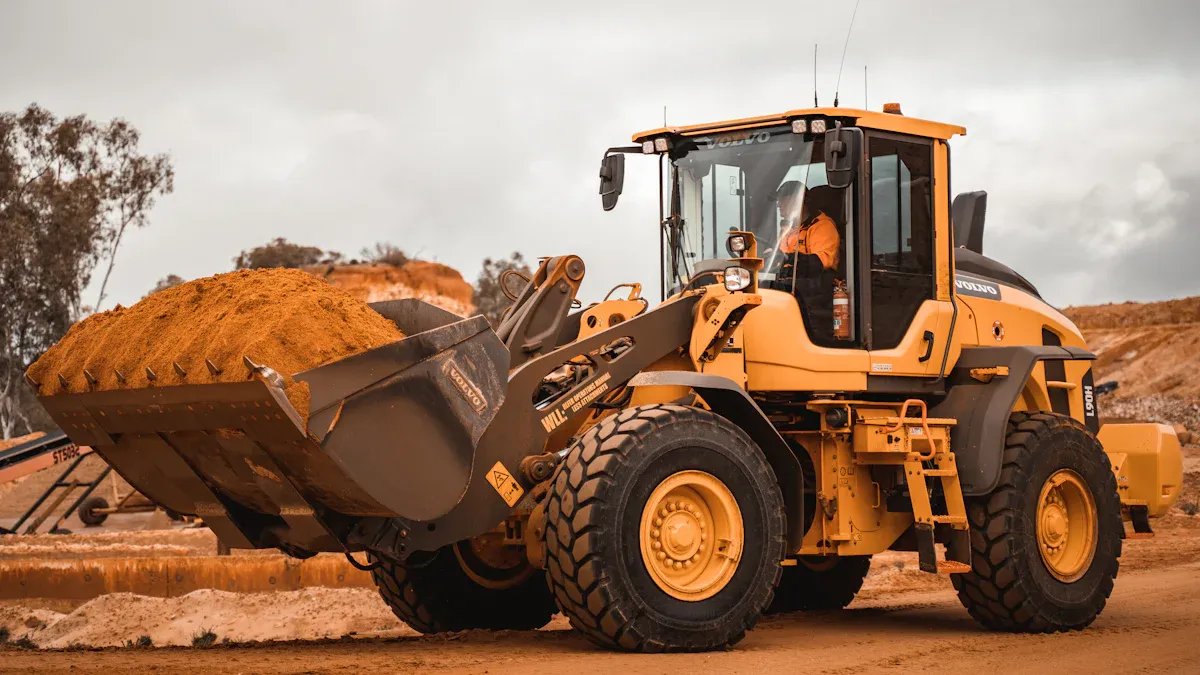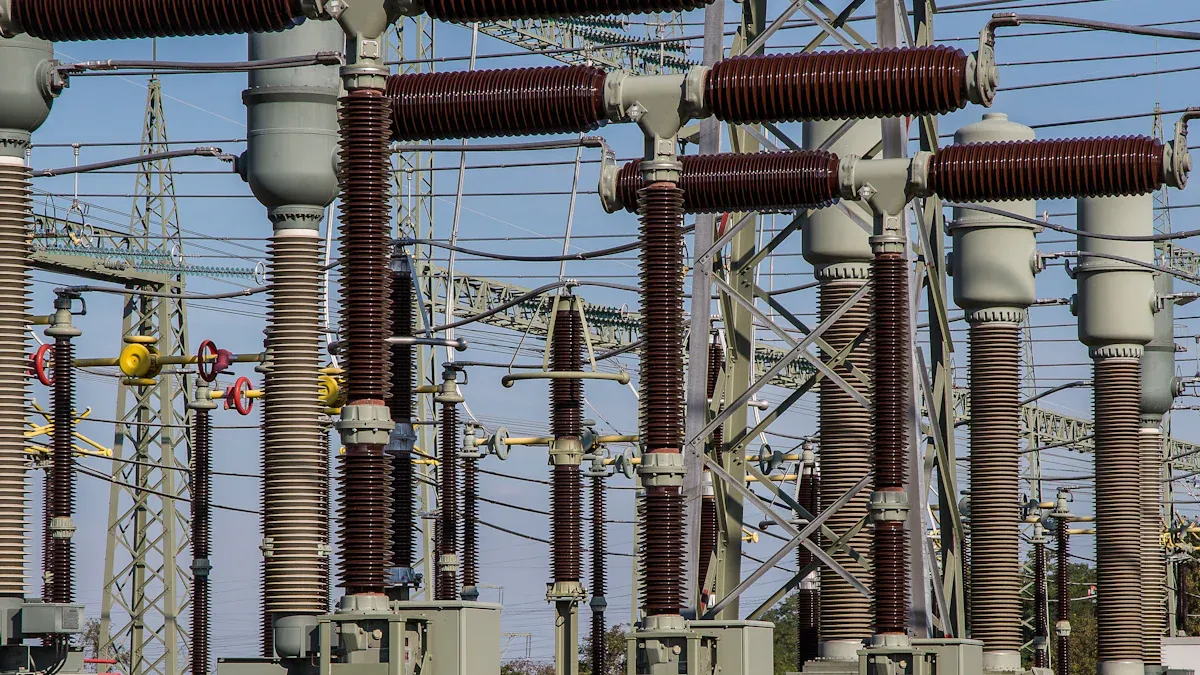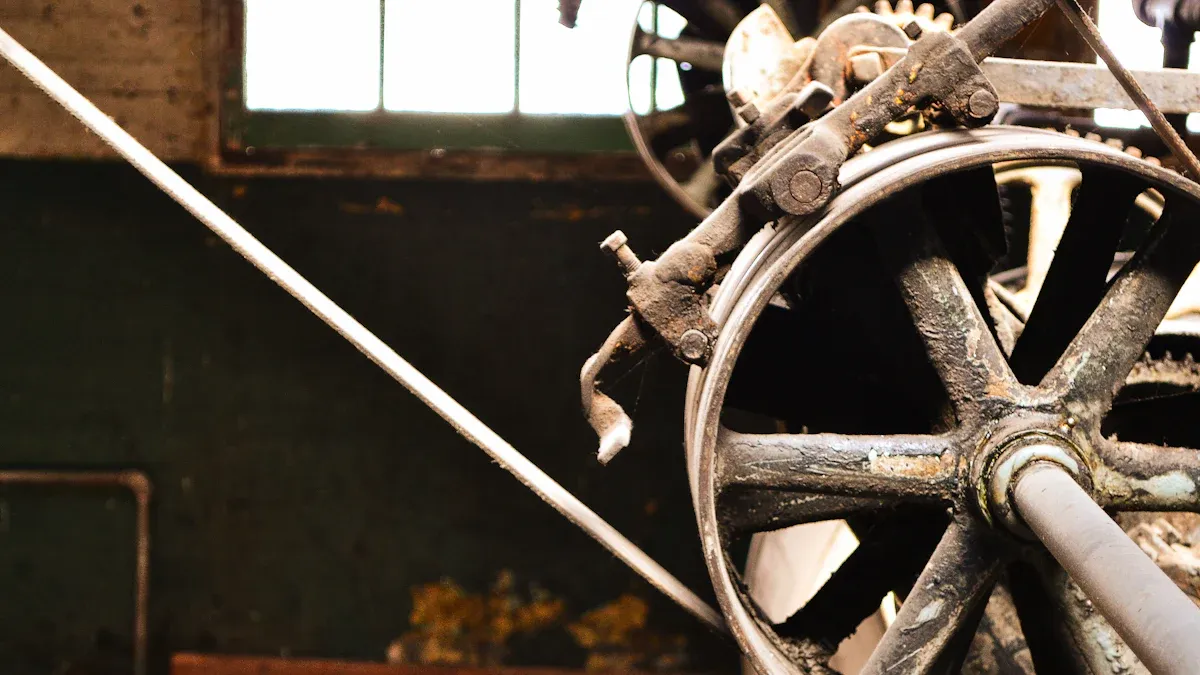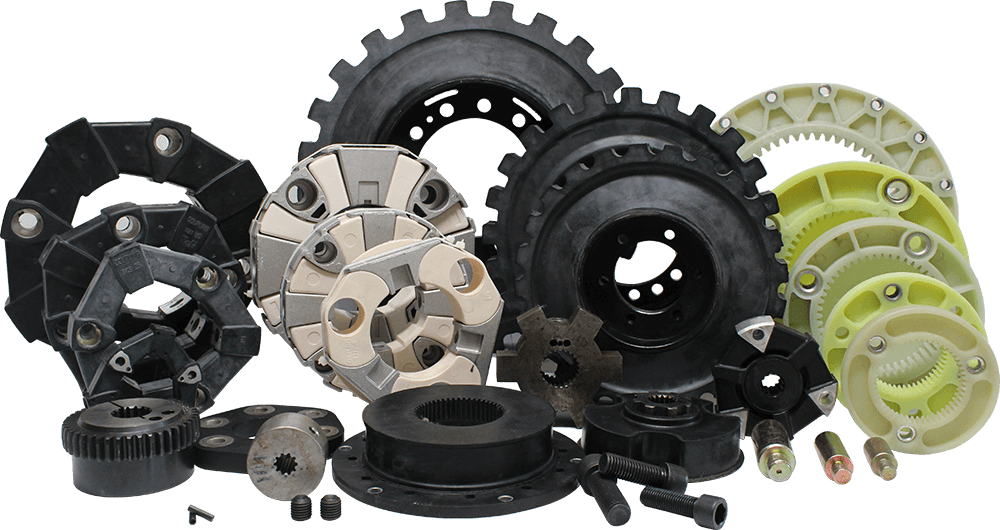
Feet for machines hold up equipment and keep it steady. Leveller feet let you change the height so machines sit flat. This makes things stable and safer. You need machines lined up right to work well and stop problems. Picking the right leveller feet helps machines work better.
Leveling feet keep equipment steady and cut down shaking. This makes the workplace safer.
They stop machines from hurting floors, so you avoid dangers.
Good leveller feet also help workers feel better and get hurt less.
Key Takeaways
Leveller feet help machines stay still and stop them from shaking. This makes the workplace safer for everyone. Picking the right leveller feet helps machines last longer and saves money on repairs. Check and take care of leveller feet often to make sure they work well and keep equipment safe. Use adjustable leveller feet on floors that are not even to keep things steady and stop accidents. Choose materials that fit your workplace to make leveller feet last longer and work better.
What Are Feet for Machines?
Definition and Purpose
Feet for machines help keep equipment steady and safe. They stop machines from shaking or moving while working. These feet hold up the weight of your equipment. They help you line up your machines the right way. Machine levelling feet let you change the height at each corner. This helps you set your machine flat, even if the floor is not even.
Tip: Machines that stay stable work better and last longer. You also lower the chance of accidents when equipment does not move.
Feet for machines do many important jobs:
They give your equipment a strong and steady base.
They are a cheap way to support machines when you do not need fancy changes.
They use tough materials that fight chemicals, oils, heat, and water. This helps them last longer in hard industrial places.
Basic Components
Most machine feet have a few main parts that help keep equipment steady and level. Here is a table that shows the usual parts you find in many designs:
Component | Description |
|---|---|
Leveling Screws | You use these to change the height and level your machines. |
Anti-slip Bases | These bases stop your equipment from sliding or moving. |
Materials | Many feet use stainless steel or elastomers. These materials are strong and easy to clean. |
Stainless steel gives you strength and stops rust. Surfaces that do not soak up liquids help you keep equipment clean and free from germs. You can find feet in many sizes and shapes for different equipment.
The materials used in machine feet are very important. Good metals and strong polymers help your machine feet last longer and work better. These materials keep their shape and strength after lots of use. Special coatings protect against rust and help machines run well. If you pick the right materials, you save time and money on fixing things.
How Leveller Feet Create a Level Surface

Adjustment Mechanism
Leveller feet help you keep your machines steady and safe. You can use the adjustment mechanism to set each foot at the right height. This lets you create a stable and level base, even if the floor is not flat. Many leveller feet use strong materials like zinc die-casting or stainless steel. These materials last a long time and resist damage from chemicals or water.
You can find two main types of leveller feet. The table below shows how each type works:
Type of Leveling Foot | Mechanism Description |
|---|---|
Articulating Leveling Feet | The base can swivel or pivot. This lets you adjust the angle for better stability on uneven floors. |
Non-Articulating Leveling Feet | The base stays fixed. This gives you a simple and stable solution without moving parts. |
When you use leveller feet, you can make small changes to the height. This helps you line up your equipment just right. The feet absorb shocks and reduce excessive vibration. This keeps your machines working well and helps them last longer.
Tip: Always check that each leveller foot touches the floor. This makes sure your machine has a stable and level base.
Preventing Vibration and Tipping
Leveller feet do more than just hold up your machines. They also stop your equipment from sliding, tipping, or shaking too much. This is very important when you work on uneven floors. The special design of leveller feet lets the base move up to 15° off center. This helps the feet adapt to bumps or dips in the floor.
Here are some ways leveller feet keep your machines safe:
They stop your equipment from tipping by keeping all corners level.
They reduce excessive vibration, which can damage machines and make them noisy.
They protect your floors from scrapes and gouges.
They help lower repair costs and make your equipment last longer.
A stable and level base creates a level surface for your machines. This improves safety and helps you get better results from your work. When you use leveller feet, you keep your machines steady and avoid problems from excessive vibration or tipping.
Benefits for Industrial Equipment
Vibration Reduction
Leveller feet help make your workplace quieter and safer. They soak up vibrations from machines on hard or bumpy floors. This means you hear less noise at work. The feet stop the shaking at the bottom of your machines. It is easier to talk and pay attention when it is not so loud.
Leveller feet cut down noise by soaking up vibrations.
They help stop machines from sliding or moving.
Your work area is more steady, so accidents are less likely.
When you lower vibration, your machines last longer. Shaking can hurt important parts inside your machines. If you stop the shaking, you save money on repairs. Your equipment will keep working well for a long time.
Leveller feet also help keep machines lined up. When machines stay level, they work better. This is very important for jobs that need things done just right, like making electronics. You get better results and better products when machines do not shake.
Equipment Longevity
Leveller feet help your machines last longer. When you use machine levelling feet, your machines have a strong base. This stops parts from wearing out too fast. Heavy duty machine leveling feet give extra support to big machines.
Many companies put leveller feet on old machines instead of buying new ones. This helps machines work longer and saves money. Keeping machines level stops problems that can break them or cost a lot to fix. Machines that shake or lean break down more often.
Note: If you do not use anti-vibration feet, your machines can have problems. This can mean more repairs and more time when machines do not work. Leveller feet help you avoid these problems and keep things running.
Your machines also work better and faster. When equipment is level, every part works like it should. This means your machines last longer and work well every day.
Safety and Product Quality
Leveller feet do more than keep machines steady. They also make your workplace safer and help you make better products. Leveller feet lower the chance of machines tipping or moving. This keeps workers and equipment safe.
Places that use leveller feet have fewer accidents. For example, in warehouses, leveller feet on racks stop them from falling. This keeps workers safe and protects what you store.
A steady and level machine helps you make better products. Many jobs need machines to be level for the best results. If machines tilt or shake, you might get mistakes in your products. Leveller feet help stop these problems by keeping machines steady.
Here is a table that shows how leveller feet help with safety and quality:
Benefit | Description |
|---|---|
Improved performance | Level machines work better and give you better results. |
Extended equipment life | Less wear and stress means your machines last longer. |
Lower maintenance costs | Stable machines need fewer repairs. |
Enhanced safety | Level machines do not tip or vibrate too much, keeping your workplace safe. |
Better product quality | Level machines help you make high-quality products every time. |
When you use equipment adjustable foot options like adjustable rubber feet, it is easy to keep machines level. This is true even if your floor is not flat. This helps keep your workplace safe and your products good. Your machines run smoothly and you avoid expensive repairs.
🛠️ Tip: Check your leveller feet often and change them if they are worn out. This easy step keeps your equipment safe and working well.
Types of Leveller Feet and Materials

Adjustable vs. Fixed
There are two main types of leveller feet. These are adjustable and fixed. Adjustable leveller feet let you change the height at each corner. This helps your equipment stay level on bumpy floors. Fixed leveller feet do not move up or down. They work best if your floor is flat and smooth.
Here is a table that shows how adjustable and fixed leveller feet are different:
Feature | Adjustable Feet | Fixed Feet |
|---|---|---|
Height Adjustment | Lets you set the height just right | No way to change the height |
Stability on Uneven Surfaces | Good for sloped or bumpy floors | Best for flat, even floors |
Adjustable leveller feet help you set the height and keep things level. You can use them on CNC machines, lathes, and compressors. They help your machines stay steady and cut down on shaking. You also see adjustable leveller feet in kitchens and labs. They help keep benches and equipment safe and steady.
Fixed leveller feet give strong support but do not change height. Use them when your floor is smooth and flat. Both types help keep machines steady. Adjustable leveller feet are better if you need to make changes.
Tip: Pick adjustable leveller feet for uneven floors. For flat floors, fixed leveller feet are a good choice.
Material Options
You need to pick the right material for your leveller feet. The material you choose affects how long they last and how strong they are. Heavy duty machine leveling feet often use stainless steel or carbon steel. These metals are strong and last a long time.
Here is a table that shows some common materials and how they work:
Material | Corrosion Resistance | Durability |
|---|---|---|
Stainless Steel | High | Good |
Carbon Steel | Moderate | High |
Rubber | Moderate | High |
Plastic | Low | Moderate |
Aluminum | Moderate | Good |
Zinc | Moderate | Moderate |
Neoprene | Moderate | High |
Stainless steel leveller feet do not rust and work well in wet places. Carbon steel and low-carbon steel are strong and hold up heavy machines. Rubber and neoprene help stop vibration. Plastic or nylon leveller feet are good for light equipment. TPE is another strong choice for heavy jobs.
If you want to stop vibration, try adjustable rubber feet. These help keep your machines quiet and steady. Always match the material to your machine and where you use it. This helps your equipment work well and stay safe.
Choosing Leveller Feet for Industrial Equipment
Load and Floor Considerations
When picking leveller feet, first look at your machine’s weight. Some feet hold only 40 lbs. Others can hold 600 to 4,000 lbs. Heavy machines need heavy duty machine leveling feet. These have a strong and stiff base. Always check your equipment’s size. Think about how much it shakes.
The kind of floor matters too. Different floors change how steady your machines are. Concrete, tile, and wood floors need different leveller feet. If your floor is bumpy or slippery, use equipment adjustable foot options. Anti-slip bases or adjustable rubber feet help keep machines safe.
Check how much weight each foot can hold.
Match the base to your floor type.
Think about how to control vibration.
Tip: Always measure your machine’s weight and floor type before buying leveller feet.
Environmental Factors
Where you use your machines can change how long leveller feet last. Hot or cold places can hurt some materials. If you use chemicals, pick feet that resist corrosion. Wet or damp areas need stainless steel parts to stop rust.
Environmental Factor | Considerations |
|---|---|
Temperature Extremes | Some materials break down in hot or cold places. |
Chemical Exposure | Use casters that resist corrosion if you use chemicals. |
Moisture | Stainless steel stops rust in wet places. |
Busy places wear out leveller feet faster. Humid or wet spots can make metal feet rust. Special coatings like zinc plating or UV stabilizers help feet last longer.
Maintenance and Replacement Tips
Check your leveller feet often to keep them working well. Clean them every day and look for damage. Lubricate moving parts each week. Check for problems every month. Replace worn parts twice a year. Once a year, have a professional check your equipment and test the load.
🛠️ Note: For strong leveller feet, try YNF Rubber. They make tough options for all kinds of industrial equipment.
Picking the right feet for machines helps your equipment work better and keeps your workplace safe. Good leveller feet hold up heavy machines, protect the floor, and soak up shocks. Here is a table that shows how they help:
Aspect | Benefit |
|---|---|
Load support | Strong base, less shaking |
Surface protection | Floors stay safe and clean |
Shock absorption | Less noise and movement |
To stay safe, look for spots where your machines do not touch the floor. Fix any gaps you find. This helps your machines stay steady and stops accidents.
Good leveller feet help you spend less on repairs, make machines last longer, and get more value from your equipment.
Machines that do not move or shake work better, last longer, and make the workplace safer for everyone.
Think about what you need and choose the best leveller feet to keep your machines working well.
FAQ
What are leveller feet used for?
You use leveller feet to keep machines steady and level. They help stop shaking and sliding. This keeps your equipment safe and working well, even on uneven floors.
How do I know which leveller feet to choose?
Check your machine’s weight and the type of floor you have. Pick feet that match these needs. If you need help, ask a supplier like YNF Rubber for advice.
How often should I check or replace leveller feet?
You should check your leveller feet every month. Look for signs of wear or damage. Replace them if you see cracks, rust, or if your machine starts to wobble.
Can leveller feet reduce noise and vibration?
Yes! Leveller feet with rubber or neoprene bases help absorb vibration. This makes your machines quieter and helps them last longer.
Where can I buy strong leveller feet for industrial machines?
You can find strong and reliable leveller feet at YNF Rubber. They offer many options for different machines and environments.









